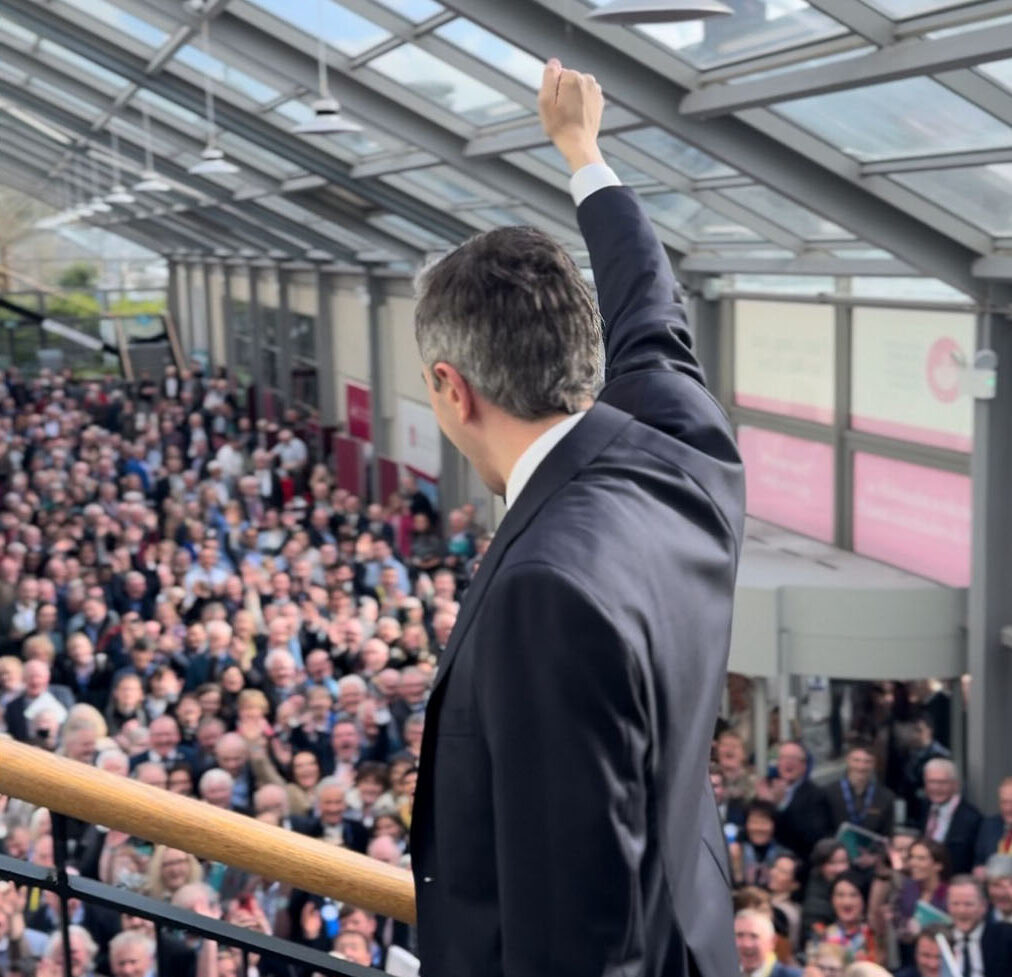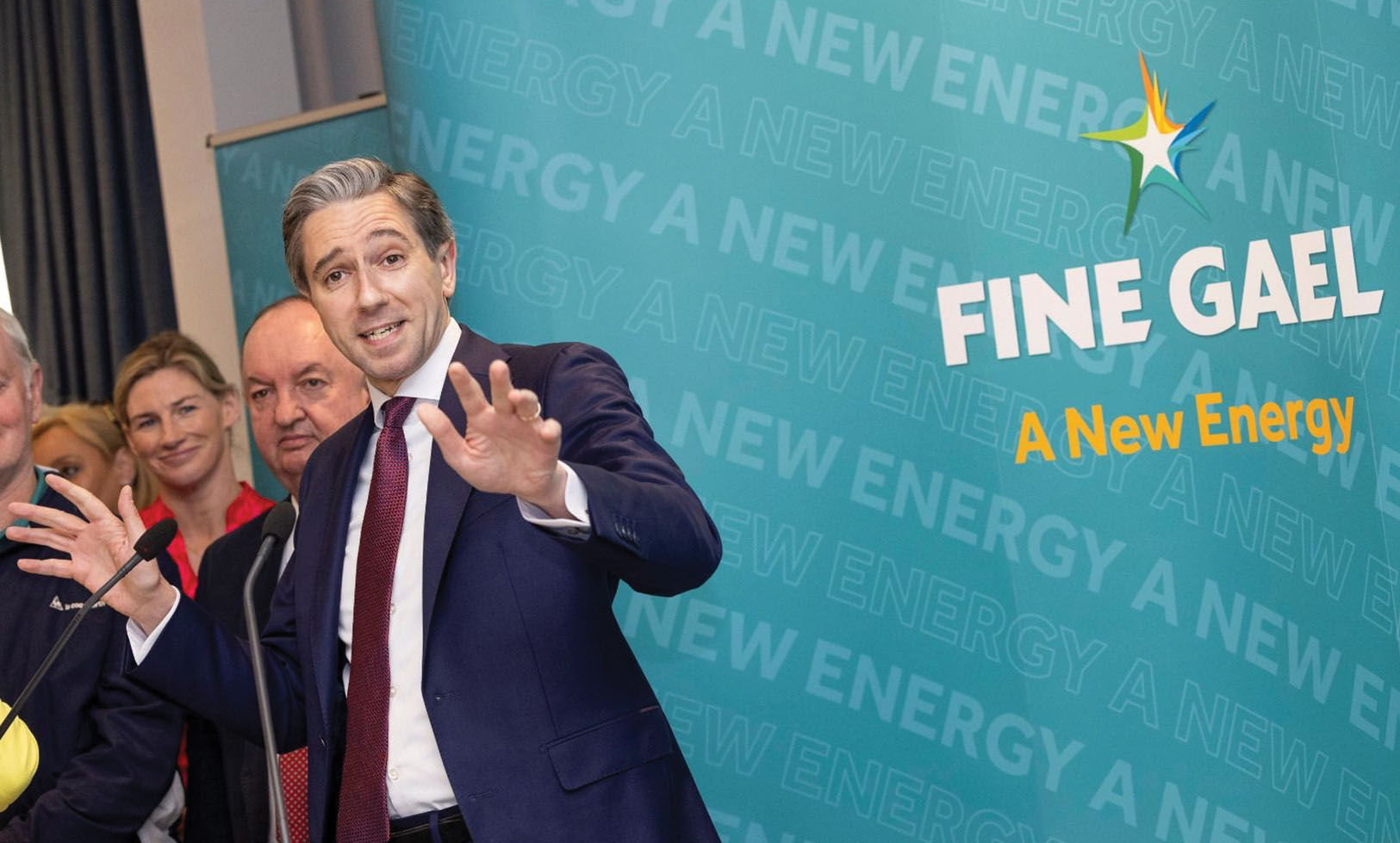From college dropout to Taoiseach: Simon Harris TD

For many northerners, the new Taoiseach, Simon Harris TD, is an unknown entity relative to his party colleagues Leo Varadkar TD and Simon Coveney. Ciarán Galway tracks the rise of the most powerful man on the island.
Having joined Young Fine Gael at 16, Simon Harris later dropped out of DIT in the first year of his journalism and French degree to pursue a career in politics. In fact, his first ever job was working as a parliamentary assistant for former Tánaiste Frances Fitzgerald – regarded as an early mentor – who was then opposition leader in the Seanad.
In his first foray, Harris attracted the greatest percentage of first preference votes of any local election candidate in the State when he was elected to Wicklow County Council in 2009. Two years later, he was elected to the 31st Dáil to represent Wicklow at the age of 24, achieving 8,726 first preference votes or 12.4 per cent of the total.
In the following two general elections, in 2016 and 2020, he would attain 15.7 per cent and 12.3 per cent of first preference votes respectively.
As ‘baby of the Dáil’, Harris was selected, as was tradition within Fine Gael, by the party to nominate Enda Kenny for Taoiseach and utilised his maiden speech in the Dáil on 9 March 2011 to do so. “It is a great honour, as the youngest member of the 31st Dáil, to rise formally today to nominate Deputy Enda Kenny as the next Taoiseach of this country,” he said, adding: “Deputy Kenny will bring to the office of the Taoiseach integrity, honesty and a work rate which simply cannot be surpassed.” Thirteen years later, Harris would be elected Taoiseach himself.
First tenure as Health Minister
Having previously been appointed as Minister of State at the Department of Finance with responsibility for the Office of Public Works, Public Procurement, and International Banking in 2014, Enda Kenny then selected Harris as Minister for Health in May 2016. At just 29 years old, he is still the youngest person to have held that office.
Succeeding Leo Varadkar – a qualified doctor – in the portfolio, it was a decision
which blindsided almost everyone. He had not been involved in the drafting of his party’s health policies or the health component of its programme for government.
From the outset, Harris was regarded as an archetypal ‘blueshirt’, something which was not always assumed of Leo Varadkar. Similarly, a devoted follower of party dogma, he has studiously avoided the sort of off-piste remarks which typified his nonconformist predecessor.
Writing in 2016, erstwhile Fine Gael TD and government minister, now broadcaster, Ivan Yeats argued: “The appointment of Simon Harris to the searingly hot seat of Health Minister has all the appearances of a serious political mistake.”
For decades, the Department of Health has been regarded as a particularly treacherous portfolio. “What does this 29-year-old raw recruit, with a journalism degree [sic], know about the complexities of acute hospital care or tertiary medicine? What skills or experience has he to draw on to deal with a myriad of vested interests, protecting administrative empires and massive budgets?” Yates asked.
However, his performances as a member of the Public Accounts Committee and Minister of State in the Department of Finance distinguished him. Yeats described him as “Fine Gael’s shooting star” and suggested that his performance as a running mate for Deirdre Clune during the 2014 European elections (which saw Harris fail to get elected) “marked him out from other backbenchers”.
During a Committee of Public Accounts special debate on vote management in the HSE – which Ambrose McLoughlin, then-Secretary General, Department of Health and Tony O’Brien, then-Deputy Chief Executive Officer, HSE were called to – in October 2012, a 25-year old Harris remarked: “While the meeting got off to a rocky start on both sides, I believe we need to – I do not think there is a parliamentary word for it – chillax… If the witnesses want to come in here and stonewall, that will not work. If people here want to grandstand, that is not serving the interests of the taxpayer either.”
Similarly, in one typical insight into his party’s self-cultivated image of prudence, responding to eolas Magazine in late 2018, then-Health Minister asserted that “the days of blank cheques are over” for the HSE.
2017 leadership contest
During the previous Fine Gael leadership election, in May 2017, Simon Harris endorsed Simon Coveney TD in his contest with Leo Varadkar – one of just 10 Fine Gael TDs and the only cabinet member to do so. Despite this, after his triumph over Coveney, Varadkar reappointed Harris as Minister for Health in his cabinet – allegedly at the petitions of Coveney.
Second tenure as Health Minister
Incredibly, given his 2011 opposition to abortion, he emerged as a leading political advocate in the Yes campaign to repeal the Eighth Amendment, his pivot earning several media plaudits and effectively eclipsing his leader. Accruing significant political capital temporarily – and only just – shielded him from several other crises across his remit.
2019 was a turbulent time for the minority Fine Gael government. In December, Harris’ former cabinet colleague, the then-Housing Minister, Eoghan Murphy, narrowly survived a Social Democrats motion of no confidence by 56 votes to 53, with 35 (mostly Fianna Fáil) abstentions/absences. Harris himself had already weathered a Sinn Féin-tabled motion of no confidence the previous January (58 to 53, with 40 abstentions/absences) in relation to National Children’s Hospital budgetary overruns.
Then in early 2020, planning to utilise the Rural Independents group’s Dáil speaking time, then-independent TD for Cork South-West, Michael Collins, proposed to move a motion of no confidence in the then-Minister for Health, Simon Harris, by 5 February.
Speaking on RTÉ’s Morning Ireland, Collins suggested that there was an “unprecedented crisis” in healthcare and argued that “someone must be held accountable”.
Five days later, on 14 January, then-Taoiseach Leo Varadkar visited Áras an Uachtaráin and signed a request that President Michael D Higgins dissolve the 32nd Dáil. The proclamation of dissolution was duly signed, and a general election date was set for 8 February.
In the context of the Fine Gael government’s confidence and supply arrangement with Fianna Fáil – whereby the opposition party agreed to abstain in key votes – it was no longer certain that the Government commanded the minimum number of votes (56) to win.

General election
While Varadkar regarded summer 2020 as “the right time” for a general election, he was forced to “acknowledge that circumstances had changed”. Speaking on RTÉ Radio 1’s This Week in advance of the dissolution, he said: “The arithmetic in Dáil has changed and that is the reality of that. So I have made a decision.”
In that moment, it appeared as though the health portfolio minefield had finally shredded the wily Harris, who had made several policy delivery commitments which did not transpire in his tenure – not least the delivery of the national children’s hospital.
Instead, health policy escaped the intense scrutiny which might have been forecast ahead of General Election 2020, obscured by cross-party consensus on Sláintecare (the plaudits of which belong to the Oireachtas Committee on the Future of Healthcare led by the Social Democrats’ Róisín Shortall TD) and with the housing crisis taking centre stage.
Covid pandemic and caretaker minister
Incredibly, while performing disastrously and winning only 35 seats – its lowest share of the popular vote since the 1948 election – compared to 50 in 2016, both Harris and the caretaker Fine Gael Government had a Lazarus-like revival, with the popularity of each (initially alongside then-Taoiseach Varadkar) soaring during the early months of the Covid pandemic.
The onset of Covid and subsequent participation in the triparty coalition masked the fact that Fine Gael had been beaten back into third place by Sinn Féin (which missed out on becoming the largest party by one seat) and spared Varadkar’s leadership.
Harris himself so successfully cleansed his image during the early months of the Covid pandemic – in the time between the general election in early February 2020 and the formation of government in late June 2020 – that the role of his underperformance in provoking the dissolution of the Dáil was effectively obliterated from popular memory.
Social media
Throughout his time as caretaker minister, Harris meticulously utilised social media platforms (acquiring an impressive 100,000 followers on Twitter by December 2020) to promote government and HSE public health messaging. Infamously, the black mirror of immaculate messaging cracked when he incorrectly advised: “Remember this is coronavirus Covid-19 – that means there have been 18 other coronaviruses.”
Prior to government formation in June 2020, eolas Magazine recorded: “Having [barely] navigated the CervicalCheck scandal, championed the successful repeal of the Eighth Amendment, and weathered the worsening health crisis more generally, he now spearheads the response to Covid-19.
“In doing so, Harris appears to have successfully manoeuvred from a near untenable position to career-defining performance as [caretaker] Minister for Health.”
Perhaps the source of his exceptional media savvy, Harris has been accompanied by his media advisor and now his chief of staff, Sarah Bardon – a former Irish Times political journalist – since August 2018.
Meanwhile, recent additions to his inner circle include government press secretary Chris Donoghue – a former Newstalk reporter who most recently served as ministerial advisor to Simon Coveney from 2017 until 2024 – and deputy government press secretary, Ciara Phelan, a former journalist with the Irish Examiner.
On social media, Harris has 240,000 followers on X, 191,000 on Instagram, and 100,000 on TikTok. In comparison, Tánaiste and Fianna Fáil president, Micheál Martin TD, has 196,000, 49,000, and 19,000 followers across the same platforms.
Life after health
Following the triparty government’s formation, Harris moved into a newly created portfolio at the Department of Further and Higher Education, Research, Innovation and Science where he sought to advance education, skills, and lifelong learning as “the most robust, transformative and lasting means to future-proof our country’s economic and social wellbeing”.
For a seven-month stint from December 2022 to June 2023, he served as Justice Minister in place of his long-time rival, Helen McEntee TD during her maternity leave. A competent performance enhanced his public persona and was in stark contrast to McEntee’s perceived handling of the portfolio.
Leadership
Unlike in 2017, the 2024 Fine Gael leadership contest was a one-horse race. Upon Varadkar’s shock retirement on 20 March 2024, only Harris was ready, and he burst out of the traps. In a masterful shock and awe blitz, he surpassed even Varadkar’s pre-emptive strike in 2017, rapidly accumulating the public endorsement of most of the Fine Gael parliamentary party within 24 hours of announcing his candidacy on 21 March.
Party titans, Simon Coveney and Paschal Donohoe, as well as prospective candidates Helen McEntee and Heather Humphreys, all ‘graciously’ excluded themselves. By the nomination deadline on 24 March, Harris was the only candidate, and he was confirmed as leader at a party meeting in Athlone, County Westmeath
Party trajectory
Perhaps given the short lifespan of the current government, some prospective leaders decided that it was not the most politically opportune moment to lead the party.
Fine Gael’s recent electoral performances in general elections have not been good. It has retreated from 76 seats in 2011, to 50 in 2016, to 35 in 2020. In terms of total first preference votes this is a dramatic decline from 36 per cent, to 26 per cent, and then to 21 per cent.
However, his reality combined with zero cabinet experience, did not perturb ‘also ran’ Jennifer Carroll MacNeill TD who subsequently found herself once again excluded from a seat at the top table despite her obvious ambitions, allied to a blistering performance as MC of the party ard fheis on the weekend before Harris was elected Taoiseach.

Energy
In his own address at the Fine Gael ard fheis, his first as leader – replete with obligatory Seamus Heaney quote – Harris asserted that it was “the honour of my life to lead this great party”. In keeping with the conference theme – ‘a new energy’ – he insisted that he would “bring energy and renewal to this party”. It was hard to avoid the implication that Fine Gael itself is cognisant that it had either run out of energy or was in possession of the ‘wrong’ energy under the previous leadership.
Speaking to delegates after the conclusion of Harris’ speech, there was widespread and genuine enthusiasm for the new leader. One Fine Gael veteran told eolas Magazine: “He is the finest man to take the stage for us since Garrett FitzGerald.”
Once the Dáil reconvened after its Easter recess, Simon Harris was nominated by deputy leader, Heather Humphreys TD, and elected Taoiseach on 9 April 2024, winning by 88 Tá to 69 Níl. In replacing Leo Varadkar TD as leader of Fine Gael and Taoiseach, Harris also unseated his predecessor as the youngest ever Taoiseach in the history of the State.
“My message is simple: I want to work every day to improve the lives of all in this country,” he declared.
The following day, his absence – ostensibly to conduct phone calls with national leaders – from Leader’s Questions in the Dáil was widely criticised by the opposition. “In his first day on the job he is a no show. He is as láthair,” Sinn Féin President Mary Lou McDonald TD observed.
Reshuffle
Meanwhile, the much-anticipated shuffle of Fine Gael’s cabinet seats failed to exemplify the much promised ‘new energy’, though there were several changes among the junior ministers. Most surprisingly, as she had hinted from the ard fheis stage, McEntee remained in situ as Justice Minister allegedly at the behest of Frances Fitzgerald.
Both in their late 30s, Harris opted to keep his rival close, expending significant political capital among party and coalition colleagues on her reappointment; a decision which belied the Minister’s performance to date.
Policy platform
Demonstrating a archetypal belief in the neoliberal interpretation of equality of opportunity, Harris utilised a speech at the 101st commemoration of Michael Collins and Arthur Griffith at Glasnevin Cemetery in 2023 to most clearly delineate his ideology.
There he advocated for a new social contract which “recognises the need to create true equality of opportunity – that no matter who you are, where you live or what your parents did before you, you can reach your full potential”.
Faced with the challenge of re-establishing Fine Gael in the European centre-right Christian democrat mould and redressing the party base – the fiscally conservative middle classes. To date, his stated policy priorities exhibit classic Fine Gael tendencies.
Polls and local elections
Having assumed the reins of power with around 11 months until a general election must be held in March 2025, Fine Gael’s performance in the June 2024 local and European elections was keenly observed.
While Fine Gael achieved its worst percentage share of first preference votes in a local election since 1991, paradoxically, it is also the first time that the party has topped the poll by popular vote in a local election since 2009.
Despite his protestations to the contrary – “to anybody who thinks this party is tired, to anyone who thinks this party lacks energy, you ain’t seen nothing yet” – after 13 years in power, Fine Gael had, until now, appeared to be running out of political dynamism.
To date, 13 of the party’s sitting TDs have confirmed that they will not contest the next general election. For party veterans and those with ambitions outside of parliamentary politics, the prospect of potentially languishing on the opposition benches for five years is too unpalatable.
With a hung Dáil all but inevitable, government formation could take several months. However, even if he lingers on as caretaker Taoiseach in the interim, Harris could still potentially hold the record for the shortest cumulative time served as Taoiseach, at least for the foreseeable future.
Having said that, aggregated opinion polling published by Ireland Votes suggests that Fine Gael is projected to achieve around 20 per cent of the vote in the coming general election, and seat projections based on those figures indicate that the party could stand to gain several seats compared with 2020. Harris’ mettle is set to be seriously tested, quite possibly as soon as autumn 2024.





